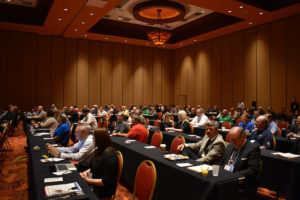As an industry, we shouldn’t just be focusing on the problems; we can also look to ELDs as a way to bring about new opportunities as well. What better way to help shape forthcoming regulations than to use data generated by an ELD design based upon diligently-crafted FMCSA specifications? Working within the framework of an existing rule we can seize the opportunity to help make future rules more sensible using a tool prescribed by the agency.
So how do we accomplish this? By talking of course, communicating and using the very things that we have been told to use since we were infants: our words. Person-to-person contact has become the most valuable tool in any association’s toolbox as we attempt to move the regulatory needle, which is why meetings such as the Truckload Carriers Association’s upcoming Safety and Security Division meeting in Norfolk, Virginia in June should be on just about every reader’s must-attend list. Being part of this meeting allows attendees the opportunity to cavort with trucking industry peers who experience many of the same problems in their day-to-day operations.

Due to ELDs, the prospect of sensible and flexible hours of service rules can no longer be viewed as a pipe dream; in fact, active users of these tools must now insist that we have rules that make sense. As an industry, we should no longer be operating in an antiquated manner and now must step into the next generation of HOS regulations that make delivering freight sane, safe, and beneficial to the schedules that drivers are complying with.
These conversations shouldn’t be limited to improved sleeper berth flexibility either. Think about the advancements in training practices that will be shared based upon the recently-generated big data. We as an industry have an opportunity to create better and safer drivers at a time when our industry truly needs them. With driver resources limited, the data generated by onboard recording devices can better prepare our limited pool of drivers by providing them with the tools to aid them in their efforts.
Limiting conversations strictly to HOS regulations may actually prove our shortsightedness as well. ELDs and the corresponding millions of data points can translate into information that we may never have seen before. Truck parking and weather-related driving are just the tip of the iceberg. Sure, the speed limiter rule was pulled back from the regulatory docket, but lo and behold one of benefits of an ELD is that you can track speed, an advantage that surely the industry’s most proactive safety professionals will expound upon and retrain drivers to further capitalize on their safety investment.
We often say “there are no secrets in safety,” and that saying will hold true in Norfolk too. While we extol the virtues of truly great technological advancements that will improve a driver’s safety performance, we will also be sharing information on gimmicks that only equal to snake oil or products that never really deliver on the promises made to this industry. It is that knowledge which also makes the fraternity of safety personnel one that had been valued time and again.


